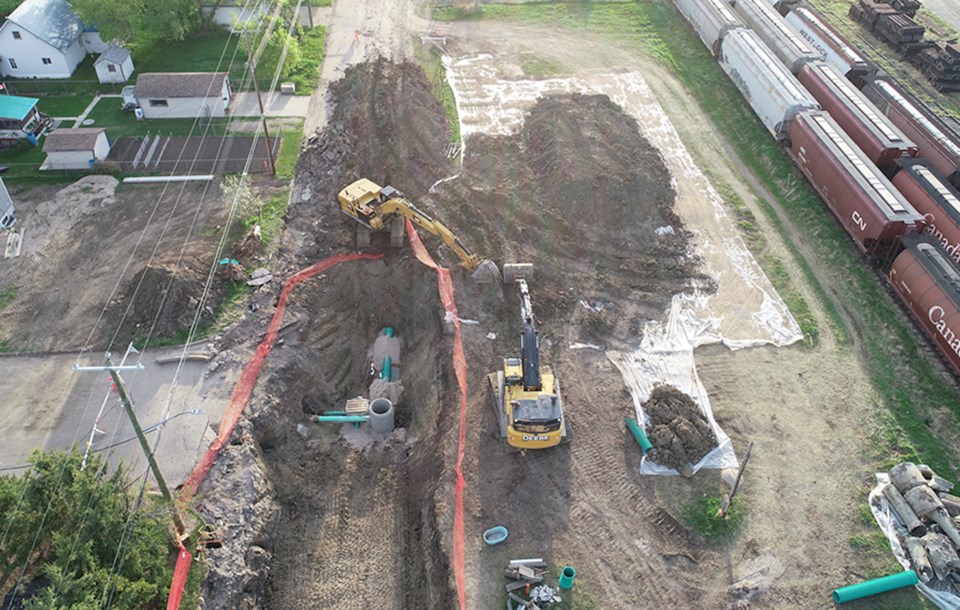WESTLOCK – Roughly two years after the discovery of “heavy concentrations of hydrocarbons” found during the massive $7.3M 108th Street reconstruction project that were linked to a long-since shuttered Imperial Oil fuel site, the final leg of the work, pegged at a cost of $1.87M, will commence this summer.
At their May 8 meeting, Town of Westlock councillors unanimously voted 6-0 (mayor Ralph Leriger was absent) to amend the municipality’s 2023-2024 capital budget for DPC30-10 Infrastructure Rehab Program 108th Street from $1,485,000 to $1,870,000 — the project will be funded via reserves, “contributions” and the Canadian Communities Building Fund Grant.
The project started April 6, 2021, and was to include a fresh asphalt overlay, new curbs, gutters, and sidewalks, as well as a new storm sewer line, sanitary sewer line and sanitary water line for the entire stretch but quickly ground to a halt following the discovery of “heavy concentrations of hydrocarbons” from a long-since shuttered Imperial Oil fuel site.
To deal with the pollution, tons of contaminated soil had to be trucked away, while a plastic liner was installed underground to contain any possible further seepage — work started at the end of May 2021 and wrapped before Canada Day that year.
By the end of the 2021 construction season, about 80 per cent of the road had been completed, while the remainder was slated to be done in 2022. Those plans changed early last year as CAO Simone Wiley said March 30, 2022, that the rest of the project wouldn’t proceed until 2023 as, “There just won’t be enough time between finishing the negotiations with Imperial Oil, finding out where that leaves us financially and then going ahead and getting into the contractor’s schedule.”
In a May 9, 2023, interview, Wiley called the additional $400,000 an “inflationary increase” because of the one-year delay and said that negotiations with Imperial Oil regarding the clean-up costs are nearing a conclusion, but added that once they’re done, they’ll be bound by a non-disclosure agreement on the settlement. Wiley has previously declined comment when asked how much Imperial has been invoiced as an initial clean-up estimate of the site was pegged at $1.6 million and in June 2021, councillors voted unanimously to amend that year’s capital budget to add $1.6 million for the work. Imperial Oil, the owners of the 300-by-94-foot lot on the southern side of 108th Street in Whissellville from where the contamination emanated, were invoiced $782,498.31 as of June 2021.
“The work will get done this year. We were delayed during our negotiation time with Imperial Oil and that’s cost us a little bit of money,” said Wiley May 9. “I can say that we’re happy with where we’ve ended up with Imperial Oil. It’s currently being worked on between our legal departments.”
Wiley said they’re meeting with Knelson Sand and Gravel Ltd. the week of May 15 and “the timelines (for the work) will be established then.” Wiley told councillors at the May 8 meeting that the $1.87 million is at the top end and that they’re still negotiating with the contractor to try and bring that number down but “ … needed this motion to be made in order to actually proceed with the project.”
“Absolutely, I don’t see why it won’t be completed this summer,” Wiley added.
Previously, operations director Robin Benoit said that aside from the contamination, the project suffered supply-chain issues, ranging from a shortage of copper piping to concrete powder, to problems with “as-built” drawings that didn’t correspond with what was underground. Work on the stretch also forced the closure of the bulk water station, which was temporarily moved to the town’s public works shop, then eventually re-opened in late 2021.
No health risks, say Imperial and province
Imperial’s public and government affairs manager said in a July 2021 e-mail that the company’s environmental consultants had conducted site assessments over the years and the data collected “does not indicate a risk to public health and safety, or the environment associated with Imperial’s past operations.”
The north side of 108th Street, heading east from 97th Avenue to 98th Avenue, includes an apartment building, plus the backyards of homes, while the CN Rail line runs parallel to the entire length of 108th Street.
Alberta Environment and Parks confirmed a similar assessment to residences in the Whissellville area, stating in a July 5, 2021, e-mail that contamination limits had been defined on the north side of the roadway and “are not expected to cause concern or issue to nearby residential properties” and that they’ll “work with Imperial Oil to ensure the contamination is appropriately managed until remediated.”
Imperial hasn’t released a timetable for reclaiming the site and said last summer that their consultants sampled the ground within the utility corridor in proximity to the property and “any soil that did not meet Alberta’s standard was disposed of at an approved disposal facility at Imperial’s cost.”
While a 2018 groundwater monitoring and sampling report provided by AEP notes elevated levels of Benzene at at least two groundwater sampling bore holes on Imperial’s land, the company spokesperson noted that since the site is vacant, they have “no concerns related to Benzene on the property.” According to the same report other chemicals tested for and found on and around the site within acceptable AEP limits included Toluene, Ethylbenzene and Xylenes.



